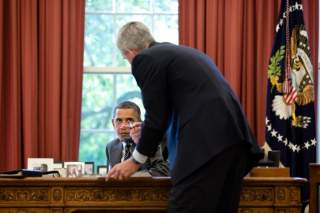The Ghosts of World War I Circle over Ukraine
Ukraine: a lingering flashpoint between Russia and America. It could get far worse.
It isn’t difficult to see why Putin bristled at this and why he felt a need to preserve his bargaining leverage in any negotiations that could be established to bring peace to this troubled land. After all the civic drama, the destruction of an elected government, the eastern rebellion, the resulting bloodshed, the Russian grab of Crimea, the great-power confrontations, it appears that the Ukrainian government is still dedicated to pulling the country out of Russia’s sphere of influence. And it is equally apparent, manifest in Obama’s increasing sanctions squeeze against Russia, that the EU and the United States stand ready to aid and abet Poroshenko’s vision.
That’s the significance of the enhanced sanctions announced by Obama just prior to the downing of the Malaysian jetliner. Obama wants Russia to stop supporting the pro-Russian separatists in eastern Ukraine who wish to break off from the government in Kiev. Obama also wants Russia to intervene with those separatists to get them to give up the fight and accept a negotiated settlement favored by Obama and his European counterparts. In other words, Obama and the EU want to neutralize Russia in the matter of Ukraine’s future so they can terminate Russia’s centuries-long dominance over the territory of Ukraine.
Russia can never accept this. No Russian leader could permit it and expect to remain Russia’s leader. So long as that threat hovers over those struggling to deal with this tragic mess, relations between Russia and the West will continue to deteriorate.
Prior to the Malaysian airliner disaster, the outcome of this standoff was an open question. But now, in the wake of this anger-generating event, Putin’s delicate maneuver game is on the verge of collapse. In the short term, it isn’t likely he will be able to reverse or impede the events leading to the integration of Ukraine, including eastern Ukraine, into the European community.
But in the long term, Russia will never accept this humiliating geopolitical defeat. Thus, will Ukraine become a festering sore between East and West, a lingering flashpoint between Russia and America. In this environment, there will be hardly any prospect at all of U.S. diplomacy enlisting Russia’s help in the pursuit of American goals in Iran, in the rest of the Middle East, in U.S. efforts to deal with a rising China, in our efforts to maintain stability in the Caucasus, or in global energy.
The ultimate outcome is likely to be written in the reality that Ukraine affects the strategic interests of Europe and America hardly at all, whereas it is crucial to Russia’s strategic well-being. That reality, coupled with the calamitous fallout of an aviation tragedy, will guide events in Ukraine and surrounding environs far into the future.
Robert W. Merry is political editor of The National Interest and the author of books on American history and foreign policy. His most recent book is Where They Stand: The American Presidents in the Eyes of Voters and Historians.

